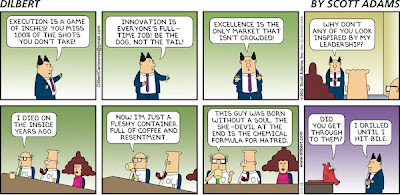Working a Project
Shamus Young - a guy whose blog I encountered from a link from a link from a link years ago (heck, when we were living in Pittsburgh, if memory serves) has been doing a series on the "Crash of the dot.com" - from an insider's perspective. Interesting stuff. The latest posts (4&5) talk about doing a project of a virtual mall in 1999 and, in his words:
We’ve combined the hassles and inconvenience of physical shopping with the uncertainty, learning curve, and security concerns of shopping online, and on top of that we’ve added the hardware requirements and navigation challenges of a first-person videogame.And it's a good read. But one of the commenters said something that caught my eye:
As a junior programmer/team member, I found that I have two modes. Every time I join a company and/or project within a company, I start in mode number 1. At some point, I usually transition into mode number 2. Not consciously or intentionally; I’ll just notice one day that I’ve done it at some point during the previous weeks.I have been the equivalent of the "junior programmer" where I start a project with people in mode 1 all enthusiastic but end up in "damage control" mode just hoping for the project to finally get over with.
Mode 1: “Let’s make an awesome project” mode. I believe in this project, and feel that my input is valued. I will make suggestions regarding the project design where I feel they’re necessary or warranted or useful, given my understanding of the project’s goals.
Mode 2: “Damage-control” mode. I feel that my input is not valued. In this mode, I have been given a set of requirements to fulfill, and I will not question those requirements. I will make suggestions regarding how to meet those requirements, or how to trim them back if they’re unrealistic and aren’t going to get done on time. But otherwise I’ll just work through my task list without comment, because I do not fundamentally care about the outcome of the project.
Mode 1 is the best. Mode 2 is sometimes necessary to protect yourself (and if you’re in a leadership role, to protect your team) in bad projects. Sometimes you’ll find yourself in Mode 2 during the final stressful weeks of a project that you’ve mostly been handling in Mode 1, and that’s totally normal. Push through those last weeks and you’ll be okay once you’re past it.
If you find that you’re in Mode 2 during the early stages of a project, though, as Shamus describes here, that’s much more of a worry.
After about two decades in the industry, my advice about figuring out what to do when you find yourself in a “I must now protect myself rather than trying to make an awesome product” mode is to look at your company’s financial situation.
If the company is making money from several different avenues right now, then it’s probably fine; you’ll survive one unpleasant project. (Back-of-the-napkin, assume the company needs to spend $100k per year per employee. If you can see a way they might be earning at least that amount from other projects, then they’re probably fine)
But if they’ve not been making much money for a while and they’ve taken on a bad project in order to make ends meet, then it’s probably time to run away; or at least start exploring other employment options.
I have almost certainly been the CAUSE of someone else moving from mode 1 to mode 2, as well, since I'm frequently in the director's/leader's/tell-'em-what-needs-done position to ask of people things that I don't fully understand the implications of.
It has taken a few years, but people here and now will often tell me when I'm asking for something unrealistic. That comes from building trust. People who I delegate to have to come to believe that I trust them - that I know they have skills and abilities and knowledge that I simply don't have. And I need to LISTEN to them. All the hedging and discomfort that Young talks about in his initial meeting with the business people is such a red flag for me - I read that in people and I know immediately I'm outside my wheelhouse and I'm asking for something that, at the very least, will be difficult and may well be impossible.
But my job is also to ask for the impossible... but then listen to what is possible... and together we stretch the boundary of where we are to get to where we want to be.


Comments